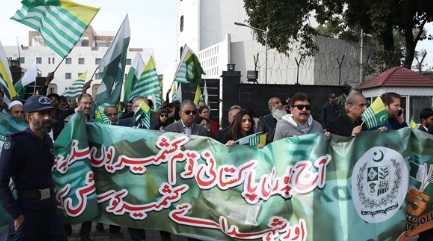
05 Feb 2023; AA: Human chains, rallies, and protest demonstrations were held across Pakistan on Sunday to express solidarity with the pro-independence movement in Jammu and Kashmir.
The day, a national holiday, began with special prayers in the mosques for the liberation of Kashmir. A minute's silence was observed throughout the country at 10 a.m. local time (0600GMT).
Thousands of people formed human chains on roads connecting the capital Islamabad to Pakistan-administered Kashmir.
The key ceremony was held near the Parliament House in Islamabad, which was attended by lawmakers, and a large number of students.
Another rally was taken out from Foreign Ministry, which was attended by diplomats, students, and civil society members.
Rallies, conferences, and seminars were also held in all four provincial capitals – Karachi, Lahore, Peshawar, and Quetta –, in addition to other big cities and remote towns, to castigate the “'human rights violations in Jammu and Kashmir.”
In Muzaffarabad, Bagh, Rawlakot, Kohlu, Mirpur, and other districts of Islamabad-administered Kashmir, also known as Azad Kashmir, human chains were formed to express solidarity with the pro-freedom struggle.
Jamat-e-Islami, a mainstream religious political party, which began observing Feb. 5 as Kashmir Day in 1990, held rallies across the country, including major congregations in Karachi, Lahore, and Peshawar.
President Arif Alvi and Prime Minister Shehbaz Sharif, in their separate messages, reiterated that Islamabad will continue to lend "moral, diplomatic and political support" to the Kashmiris' just cause.
Sharif urged India to honor its commitments made to Pakistan, the UN, and, above all, to the Kashmiri people regarding the right to self-determination.
"The Jammu and Kashmir dispute is one of the oldest, unresolved items on the agenda of the United Nations. Over the last seventy-five years, India has continued its illegal occupation of Jammu and Kashmir and suppressed its people," Sharif said.
Chairman Joint Chiefs of Staff Committee Gen. Sahir Shamshad Mirza, Army Chief Gen. Asim Munir, and chiefs of navy and air force also paid tribute to the "indigenous freedom struggle of Kashmiris.”
Sharif also addressed the Pakistan-administer Kashmir Legislative Assembly session in Muzaffarabad where he demanded ''the release of political prisoners in India and a ban on the use of pellet guns, that have left hundreds of Kashmiris visually impaired.''
Pakistan’s Foreign Minister Bilawal Bhutto Zardari also addressed letters to the president of the UN General Assembly, the president of the UN Security Council, the UN secretary-general, UN High Commissioner for Human Rights, and the OIC secretary-general to apprise them of the latest developments in the Indian Illegally Occupied Jammu and Kashmir (IIOJK). In these letters, the foreign minister called for the implementation of the relevant Security Council resolutions to enable the people of Jammu and Kashmir to determine their own future, according to a statement issued by the Foreign Ministry.
Disputed region
Kashmir, a Muslim-majority Himalayan region, is held by India and Pakistan in parts and claimed by both in full. A small sliver of Kashmir is also held by China.
Since they were partitioned in 1947, the two countries have fought three wars – in 1948, 1965, and 1971 – two of them over Kashmir.
Also, in the Siachen glacier in northern Kashmir, Indian and Pakistani troops have fought intermittently since 1984. A cease-fire came into effect in 2003.
In August 2019, India scrapped the long-standing semi-autonomous status of the disputed valley, a controversial move that prompted Islamabad to downgrade its diplomatic mission and halt trade with New Delhi.
Some Kashmiri groups in Jammu and Kashmir have been fighting against Indian rule for independence, or unification with neighboring Pakistan.
According to several human rights organizations, thousands of people have reportedly been killed in the conflict in the region since 1989.




